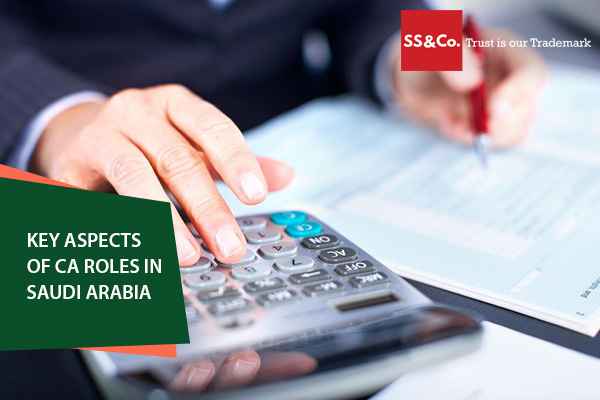Key aspects of CA roles in Saudi Arabia

The role of a Chartered Accountant might not seem very critical for a business, but they actually operate as internationally trusted financial strategists who are often the real heroes behind the thriving business operations. Consider them as a caretaker of the endless financial complexities, aiding companies through audits, tax compliance, and crafting strategies that transform risks into actual opportunities. Be it advising a global business, guiding a family-owned company, or supporting a startup, a chartered accountant plays a major role in offering precision, proactiveness, and integrity that lets any business stand out in the competitive market crowd. Their skills are not just limited to structuring budgets, but they also help them build stronger foundations that lead to growth, ensure compliance with the evolving laws, and open new doors of possibilities.
Being one of the greatest economies in the Middle East, KSA is going through a huge transformation under the Vision 2030 plan. This economic revolution is revamping every area, including the regulatory demands. Hence, hiring or outsourcing one of the best chartered accountants in Saudi Arabia today is not just an option but a modern-day necessity. They not just keep the businesses in line with the evolving regional legislation but also keep them disciplined financially and operationally. This blog will explore the key aspects of CA roles in Saudi Arabia, covering their responsibilities and opportunities.
The Saudi Regulatory Environment and the Role of Cas
The Saudi Regulatory Environment is looked after by several different authorities that offer several regulatory guidelines from time to time that must be fully adhered to stay compliant in KSA. These authorities include,
- Zakat, Tax and Custom Authority (ZATCA): It is accountable for looking after Zakat, VAT, corporate tax, excise tax, and e-invoicing regulations
- Capital Market Authority (CMA): It looks after the company’s securities and the requirements related to financial reporting.
- Ministry of Commerce (MoC): The Ministry of Commerce (MoC) governs the registration of companies, statutory compliance, and public filing
- Saudi Organization for Chartered and Professional Accountants (SOCPA): They oversee the accounting and auditing standards and administer the profession.
Chartered accountants operating in Saudi Arabia aid in supervising this regulatory environment and their legal needs to comply fully with the continuously changing laws. They play a pivotal role in clarifying the local regulations, aligning with International Reporting Standards (IFRS), and offering support in managing compliance risks and audits.
5 Key Responsibilities of a Chartered Accountant
A chartered accountant’s role is no longer just traditional bookkeeping or auditing services, but they are expected to play a bigger role as a financial strategist, compliance professionals, business advisors, and technology expert.

1. Financial Reporting and Compliance
To keep the regional standards in line with global practices, KSA has implemented IFRS, making it one of the foremost duties of a CA in Saudi Arabia. A chartered accountant makes sure that all the financial statements are as per the global IFRS standards and local SOCPA guidelines. They also maintain transparency in the documentation to foster better relationships with investors, regulators, and stakeholders. This financial data later helps the authorities to make thoughtful business decisions. Additionally, Chartered accountants also look after the compliance of a business, which involves taking care of ZATCA regulations. They help to compute the taxes accurately as per the requirements.
- Zakat is calculated on the net profit as per the Zakatable base for Saudi and GCC-owned entities.
- Corporate tax is only applicable to foreign shareholders
- Withholding Tax is levied on the cross-border payments that are paid to non-residents
- VAT and Excise Tax are applied on the goods and services with strong legal and e-invoicing requirements
These procedures demand a skilled professional accountant to keep a business fully aligned with the complex chain of regulations and to keep them guarded from legal penalties, as even a minor error may result in heavy financial and reputational loss
2. Audit and Assurance
Auditing is one of the important roles that CAs provide in KSA. Both the internal and external audits are important to reinforce clarity and confidence.
- External Audits: Chartered accountants offer assurance on whether the financial statements provide a true and fair view. Many private firms and listed companies must appoint a licensed auditor.
- Internal Audits: CAs conduct audits internally to analyze the risks, offer internal controls, and detect any fraud and data breaches.
- Regulatory Assurance: Audit reports are submitted to regulatory bodies by CAs.
The role of audit services has amplified today from accuracy in finances to evaluating governance, management of risks, and sustainability reporting, which has also increased the need for chartered accountants.
3. Taxation and Zakat Advisory
With the introduction of VAT in KSA, the Saudi Taxation landscape has strengthened with the latest regulations, excise taxes, and innovation of Zakat Assessments. Chartered accountants assist in,
- Management of input and output VAT, filing of returns, e-invoicing regulations, and controlling VAT refunds
- Handling excise taxes, which are applied on goods like tobacco, sugary drinks, and energy drinks, demands the right calculation of taxes.
- Making sure that Zakat Base is calculated precisely as per SOCPA guidelines.
- Compliance facilitation of transfer pricing for multinational businesses.
4. Business Advisory and Strategic Role
Businesses in Saudi Arabia are progressively working towards diversifying, and with the guidance of a chartered accountant by their side, they can get the benefits of:
- A structured business with organized legal and tax structures for investors
- Thorough due diligence, valuation of deals, and best integration practices for mergers and acquisitions
- Assisting firms in managing the capital flows, boosting cost structures, and elevating profits
- Detecting any operational, financial, or compliance drawbacks to guard the assets.
5. Technology Integration and Evolving Roles
Saudi Arabia prioritizes the digital transformation, mainly in areas like taxation and financial reporting. Specifically, the introduction of Phase 1 and Phase 2 of e-invoicing by ZATCA is a significant milestone. Today, CAs are also experts in
- Guiding companies in e-invoicing regulations
- Deploying the advanced cloud-based accounting system
- Making sure of cybersecurity and data ethics
- Utilizing AI and automation for auditing and the detection of fraud
Industry-Wise Opportunities for CAs in Saudi Arabia
The requirement for chartered accountants in Saudi Arabia has widened across various industries,
- Oil & Gas: CAs manage the finances of KSA’s largest petroleum sectors
- Banking & Finance: CAs make certain that banks and finance businesses are complying with CMAs IFRS regulations
- Construction & Real Estate: Management of finance projects, cost accounting, and risks in construction and real estate.
- Retail & E-commerce: compliance with VAT, cost analysis of supply chain, and management of cash flow.
- Healthcare & Education: guide them in budgeting and optimizing cost strategies and compliance with regulations
- SMEs and Startups: facilitating them with economical accounting and advisory services and planning that help in long-term success
When Is a Chartered Accountant Mandatory?
Many businesses often confuse whether they should hire a chartered accountant or not. The answer is clear: the companies are under no pressure to hire or outsource a chartered accountant. That being said, the intricacies of accounting regulations can be at times hard to handle by the internal teams already piled up with never-ending tasks. Therefore, businesses can choose between the three options of,
- Keeping your accounts fully structured with internal teams is possible for startups or small businesses
- Onboarding the best chartered accountants in Saudi Arabia to manage the complex and continuously evolving laws, and giving them full authority over accounting matters
- Outsourcing external chartered accountants through accounting firms to take care of accounts and compliance matters. This is suitable for businesses of all sizes, as they can scale up or scale down services as per their needs.
Even though not all businesses require a chartered accountant, many companies prefer to get the benefit of chartered accountant services due to the following reasons,
- They offer the best skills in accounting, legal, social, administrative, and tax matters
- They assure that all the documents are clear, organized, and correct
- They help the internal team focus stress-free on core areas.
- They know how to integrate the compliant accounting tools
- They provide a huge range of services, not just limited to accounting
How SS&CO KSA Empowers Your Chartered Accounting Journey
The need for a chartered accountant is the foundation of a strong and successful business, covering beyond the bookkeeping services. At SS&CO KSA, we know the value that some of the best chartered accountants in Saudi Arabia can bring to your business operations. We have a fully committed team that is dedicated to supporting you in your financial goals with intelligence, progress, and reliability. No matter if you demand errorless financial data, building strategies for scaling, or building risk management frameworks, we facilitate you with custom-made solutions that are made keeping your needs and visions in mind. SS&CO, being one of the best CA firms in Riyadh, offers services across the Kingdom. We help you fuel success, integrity, and economic excellence.

